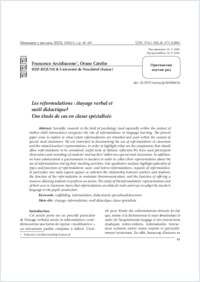Les reformulations: étayage verbal et outil didactique? : Une étude de cas en classe spécialisée
- Arcidiacono, Francesco ORCID Haute École Pédagogique BEJUNE
- Catelin, Orane
- 2016
Published in:
- Иновацијe у настави / Teaching Innovations. - 2016, vol. 29, no. 3, p. 45-60
English
Scientific research in the field of psychology (and especially within the context of mother-child interactions) recognizes the role of reformulations in language learning. The present paper aims to explore to what extent reformulations are intended and used within the context of special need classrooms. We are interested in documenting the use of reformulations in classroom and the related teachers’ representations, in order to highlight what are the components that should allow reformulations to be considered useful tools of didactic reflection.We have used participant observation and recordings of students’ and teachers’ talkin two special need classrooms. In addition, we have administered a questionnaire to teachers in order to collect their representations about the use of reformulations during their teaching activities. Our qualitative analyses highlight aplurality of types and functions of reformulations: auto- and hetero-reformulations, requests of reformulation. In particular, two main aspects appear as salientin the relationship between teachers and students: the function of the reformulation to maintain thecommunication; and the function of offering a resource allowing students to perform an action. The study of thereformulations’ representations and of their uses in classroom shows that reformulations are didactic tools and ways to adapt the teacher’s language to the pupils’ production.
- Language
-
- French
- License
- Open access status
- gold
- Identifiers
- Persistent URL
- https://roar.hep-bejune.ch/hepbejune/documents/312149
Statistics
Document views: 99
File downloads:
- 0352-23341603045A: 137
